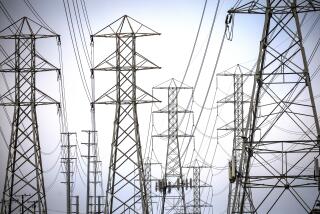Charging electric cars at home: Utility discounts compared
Electric car owners can get special discounts from utilities to charge their vehicles at home, but the amounts vary widely among power companies, according to a new study of charging costs.
The study by Northeast Group calculated that Los Angeles Department of Water and Power customers pay 53 cents per gallon of gas equivalent to charge at home, 40 cents cheaper than the average cost of discount programs nationwide.
Southern California Edison customers choose from one of two discounted rate plans, depending on their usage habits, costing $1.11 or $1.24 per gallon equivalent. Pasadena Water and Power customers pay either 49 cents or 65 cents. San Diego Gas & Electric offers a much less generous rate, with consumers paying $1.62.
The rates offered can be an additional incentive for drivers to switch to electric, which already knocks a hefty chunk of change off the amount they pour into their cars each month. The U.S. Department of Energy launched its online tool eGallon last month to show EV drivers just how much they save compared with gas vehicle owners.
Even without the special utility rates, EV drivers pay about $1.14 per gallon equivalent -- less than half of the national fuel average of $3.65. According to the DOE’s measure, California’s average for a gallon of gas is $3.98, compared with $1.51 for an electric gallon equivalent.
To compare each of the 24 utilities in the U.S. offering discounts, researchers assumed 70% of charging was done during off-peak hours (typically overnight and weekends), with 1,100 miles driven per month at a rate of 3 miles per kWh (the mpg equivalent for an electric vehicle).
Hawaiian Electric Light Co. customers pay the most, at $2.51 on one of its rate plans, while Indianapolis Power and Light customers pay just 34 cents. Hawaii’s eGallon average is on the high end, about $3.69, nearly the same as a gallon of fuel.
According to the study, Connecticut and New York are in the process of filing for approval of their own special rate programs. Texas has developed public EV charging infrastructure but has limited residential charging plans.
The study’s findings underscore that even though EVs often have higher sticker prices than their gas-powered peers, fuel savings continue to be a top-selling point for new buyers. That’s where utilities, researchers said, will play a “critical role” in advancing the consumer acceptance of electric cars.
ALSO:
Chevy Volt bests Nissan Leaf in EV smackdown
2014 Corvette Stingray gets 30 mpg, Chevy says
Electric car industry reps cheered by market growth






